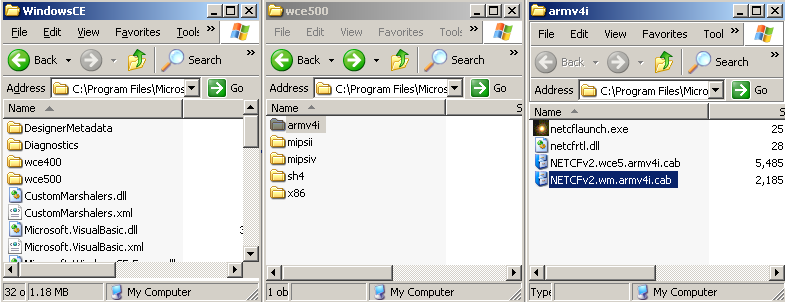Table of Contents
Installing on a PocketPC
NOTE: This is ONLY for the older V1 and V2 packages. There's no way (currently) to physically talk from a PocketPC to a new V3 ECU since our V3 cables are all USB. The older packages used serial DB9 cables and could be adapted to mobile platforms fairly well. The new cables are not so easily adapted. Plus there are SEVERAL more mobile platforms to support these days anyway.
Spyros Gounaropoulos has done an incredible amount of work creating a native PocketPC application to talk to a DSMLink ECU. We thank him greatly for this! Like the Palm port, this port involved a complete rewrite of the application. There is no way to overstate how much work was involved in this porting effort! Huge thanks to Spyros for posting this up on the forums. I'm going to copy his text below for archival purposes.
Details
I have finished ( or so I think) the porting of dsmlink to the windows mobile version. Tested the 2g version on my car and it works pretty good. All code has been ported to C# with Visual studio.
I was not able to test the 1g portion of it since the FakeECU do not support 1952 . It may have bugs for now but so far everything seems to be working ok.
I was able to datalog on my car with my Axim X30 and a serial cable, no null modem was needed in my case using COM1 on the PocketPC. To install the program you will need Compact Framework 2 and the app.
Files can be found here.
https://www.ecmtuning.com/images/forums/oses/ppc/
You start by copying the NETCF.CAB file from your PC to your PocketPC and then execute it on the PocketPC. That installs the base .NET framework stuff. Then you run the dsmlinkInstaller.exe file on your PC to install the actual DSMLink application onto your PocketPC.
More Details
More details were provided by one of our board users (JSMCPN). I'll copy his text below.
Hi, I'm just making it known that my HP iPaq hx2490b works great with DSMLink_PPC running WindowsCE v5.
Here are some 'Link installation tips for Windows Mobile devices:
There are multiple processor architectures available for pocket devices: x86, ARM, MIPS, etc. You must install the correct version of Microsoft .NET Compact Framework 2.0 SP1 that is compiled for your pocket device's architecture.
When you install the Compact Framework on your Windows PC, navigate to
%ProgramFiles%\Microsoft.NET\SDK\CompactFramework\v2.0\WindowsCE
and you will see directories for WindowsCE v4 and v5. Determine which version your device runs and open that folder. Now determine which processor architecture your device uses, and open that folder. Sync the contents of that folder to your pocket device and install the appropriate CAB file. My iPaq is Windows Mobile 5 operating system, and is an Intel XScale processor which is ARM-based.
Now install DSMLink.cab for PPC and have fun.
This implementation by Spiro is very well done. My iPaq-to-serial cable, and a null modem adapter connect to DSMLink quickly and reliably, and communication rate is pretty good. The only problem with the software I have found is I get an error when trying to map the logged value ZT2WB to a physical signal input.
